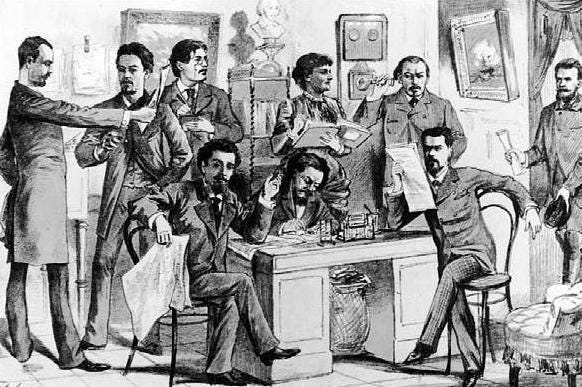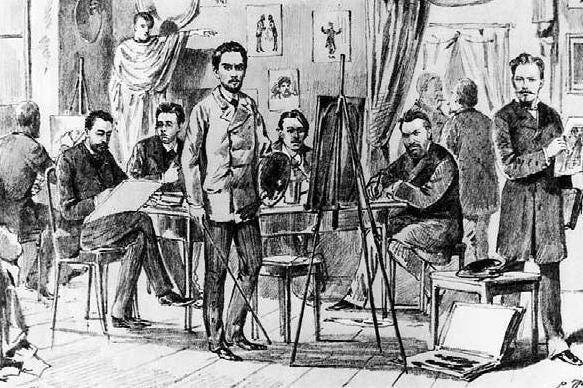The only writing advice you need, Anton Chekhov edition
rules for aspiring authors
While reading my way through his work, I stumbled upon one curious text: a listicle featuring writing advice from the master himself. I thought it would be fun to translate and share it with you, not for the sake of helping to learn something or adding value but just to present what Anton Pavlovich considered as rules for authors. It's humorous, satirical, harsh, direct and completely orthogonal to writing advice in our era.
Rules for Aspiring Authors was printed in 1885, the issue №12 of The Wake-up Caller1 magazine, on page 145. The issue was dedicated to the magazine's twentieth anniversary and the Rules were presented as a gift for the readers: "It is also said, there is no group that does not split up. The jubilee is over. In conclusion – a little gift..."

In 1904, in The Wake-up Caller № 27, on 18 July, Chekhov's obituary was printed. Right after the obituary, The Rules you are about to read were printed together with A Toast in Honour of Prose Writers under one heading – Chekhov's pages.
"...We present here," the obituary said, "two fine examples of Chekhov's original humour, two short articles which appeared in the pages of The Wake-up Caller some twenty years ago and touch on the life and work of a Russian writer, a title which was sacred to Chekhov."

Any newborn baby should be thoroughly bathed and, after giving him a rest from his first impressions, severely whipped and told: "Don't write! Don't write! Don't be a writer!" If in spite of this punishment, the baby will show writing tendencies, a caress should be tried. If a caress doesn't help, give up on the baby – he is as good as lost2. The writing itch is incurable.
The path of the writer from start to finish is paved with thorns, nails and nettle, and therefore any sensible person must remove himself from writing by any means. However, if inexorable fate, despite all warnings, pushes someone on the path of authorship, to mitigate his fate, such a miserable person should be guided by the following rules.
It should be remembered, that accidental authorship and authorship à propos is better than regular writing. A conductor3 writing poetry lives a better life than a poet not serving as a conductor.
It should be also borne in mind, failure in the literary field is one thousand times better than luck. The former is penalised only by disappointment and upsetting frankness at the mailbox. The latter entails a lingering quest for fees, getting the fees in the 1899 year coupons4, "consequences" and new attempts.
Writing as "Art for Art's sake" is more profitable than creating for filthy lucre. Writers don't buy houses, don't travel in first-class compartments, don't play roulette, and don't eat sterlet5 fish soup. Their food is honey and acrid6 cooked by Savrasenkov7, they dwell in pre-furnished rooms, their mode of transportation is walking.
Glory is a vivid patch on a ramshackle poet's garment8, but literary fame is conceivable only in those countries where people do not look into the Dictionary of 30,000 Foreign Words9 to comprehend the word "literator"10.
Everyone without distinction of rank, religion, age, sex, educational qualifications or marital status may try to write. Even the insane, the amateur stagehands and the disenfranchised are not banned from writing. It is desirable, however, that those climbing Parnassus11 should be as mature as possible and know that the words "to ride" and "bread" are spelt with "e"12.
Preferably they should, if possible, be neither cadets nor gymnasts.
It is assumed that the writer, apart from having ordinary mental faculties, should have experience behind him. The highest fees are paid to people who have been through fire, water and trumpets13, while the lowest are paid to those who are untouched and unspoiled. The former married for the third time, failed suicide, gambled themselves to smithereens, fought a duel, escaped from debts, and so on. The latter are those who have had no debts, who are grooms, non-drinkers, institute-scholar girls14, etc.
It's not hard to become a writer. There’s always a freak that can find a match, and there’s always nonsense that can find a suitable reader. Hence don't be shy... Put the paper down in front of you, take the nib pen in your hand, irritate the captive thought15, and scribble. Scribble about whatever you like: prunes, weather, Govorovsky kvass16, the Great Ocean, the hour hand, last year's snow... When you have finished scribbling, take the manuscript in your hands and, with a sense of holy trembling in your veins, go to the editor's office. Take off your galoshes17 in the front door and ask: "Is Mr Editor here?", enter the sanctuary and, full of hope, hand over your creation... After that, for a week, you lie at home on the divan, spit on the ceiling and indulge in dreams, and then after a week go to the editorial office and get your manuscript back. This is followed by knocking on doors of other editorial offices... When all the editorial offices are bypassed and the manuscript is accepted nowhere, print your work as a standalone edition. Readers will be found.
Yet becoming a writer who is published and read is very difficult. To do so: be perfectly literate and have a talent at least the size of a lentil seed. The absence of big talents means the absence of long journeys.
Be decent. Don't claim what’s stolen as your own, don't print the same thing in two magazines at once, don't claim to be Kurochkin and Kurochkin to be you, don't call a foreign thing an original, etc. In general, remember the Ten Commandments.
In the printing world, there is decorum. Just as in life, it is not advisable to step on someone else's favourite calluses, blow your nose in someone else's handkerchief, put your fingertips into someone else's dish, etc.
If you want to write, do this. Choose a topic first. You have complete freedom here. You are free to use your arbitrariness and even your self-control. But, in order not to discover America a second time and reinvent gunpowder, avoid topics that have been hackneyed for a long time.
Once you have chosen a topic, take a rust-free pen and in legible, non-scribbly handwriting, write what you want on one side of the paper, leaving the other side untouched. The latter is desirable not so much for the sake of increasing the profits of paper manufacturers, but for other, supreme considerations.
When giving free rein to your imagination, hold back your hand. Don't let it chase the number of lines. The shorter and less often you write, the more and more often you get published. Brevity doesn't spoil things at all. A stretched rubber erases words no better than an unstretched one.
Once you have written it, sign it. If you don't chase fame and don't want to get beaten up, use a pseudonym. But remember that no matter what kind of visor hides you from the public, your name and address must be known to the publisher. This is just in case the publisher wants to wish you a Happy New Year.
Receive your fee as soon as it is printed. Avoid advance payments. Advances are eating up the future.
Once you've got your fee, do whatever you want with it: buy yourself a steamboat, dehydrate the marsh, have your photograph taken, order a bell from Finlyandsky18, triple the size of your wife's bustle... in short, whatever you want. The editorial office, together with your fee, gives you full freedom of action. Although, if an employee wants to send an invoice, showing how and where he spent his fee, the editorial office will have nothing against that.
In conclusion, read again the first few lines of these rules.
Footnotes:
I am using "The Wake-up Caller" instead of "The Alarm Clock" because it's closer etymologically to the original title "Budilnik" ("Будильник").
The original sentence has two idiomatic phrases in a row: "wave hand on the baby" and "write it's gone/wasted", which together mean – "give up on the baby, it's a futile task"
“A conductor” here means either 1) a military rank in the Imperial Russian Navy awarded to non-commissioned officers who have served the prescribed period and passed the examination and upon the opening of a vacancy; or 2) a military rank awarded to draftsmen and artists in chief, district and field engineering offices; or 3) lower rank of the forest guard; or 4) a pupil, generally, in various engineering, construction or other departments
“Coupons” may point out to securities of a certain denomination or payment term, which, taking into account when the article was written, makes it completely ridiculous
In Russia, it the sterlet held in high esteem on account of its excellent flesh, contributing also to the best kinds of caviar and isinglass. - Wiki
"To eat acrid (and wild honey)" is an archaic way of saying "to eat sparingly, half-starved". It's used ironically and refers to the gospel parable about John the Baptist, who ate locusts (acrids) and wild honey in the desert.
K.E. Savrasenkov was an owner of a hotel and restaurant on Tverskoy Boulevard in Moscow (not the best ones, considering the preceding few words).
Inaccurate quotation of a fragment from A.S. Pushkin's poem "Conversation Of a Bookseller With a Poet" (1824)
This is the "Explanatory Dictionary of Foreign Words in Use in the Russian Language with Indication of Their Roots" by A.D. Michelson.
Latin litterator, French littérateur (from Latin littera - a letter), a literary person, especially a writer of literary works.
The name "Parnassus" in literature typically refers to its distinction as the home of poetry, literature, and learning; the Montparnasse area in Paris, France, for example, bears its name from the many literature students who recited poetry in the streets, who as a result nicknamed it "(le) Mont Parnasse".
In the original Chekhov writes, "знающие, что слова «ѣхать» и «хлѣб» пишутся через «ѣ»." It can be translated as "knowing, that words "to ridѣ" and "brѣad" are spelt with "ѣ" (yat'). Yat or Jat (Ѣ ѣ) is the thirty-second letter of the old Cyrillic alphabet, it was spelt in many words in place of “e” at the present moment.
There exists a Russian idiom, "to go through fire, water and trumpets" (пройти огонь, воду и медные трубы) meaning approximately "to go to hell and back"; in other words, to persevere in the face of extreme adversity.
In the original "институтки" (institutki, literally - women in institutes) - girl pupils of a privileged boarding school in pre-revolutionary Russia.
A paraphrase of the fourth line of Lermontov's poem "Don't Believe Yourself" (1839).
Kvass (in memes so-called "bread juice", or Russian cola, if that helps) is a fermented cereal-based non-alcoholic or low alcoholic beverage with a slightly cloudy appearance, light-dark brown colour and sweet-sour taste. "Govorovsky" is the name of one of the kvass factories.
Waterproof overshoes.
P. N. Finlyandsky is the owner of a bell-casting factory in Moscow. In "Fragments of Moscow life" ("Oskolki", 1883, №37) Chekhov wrote: "In the evening in the Finlandsky Bell Factory a big bell rings by itself. The sound is dull, lingering, almost sepulchral, it begins at 8 o'clock and ends at 10".



So great, and really enjoyed the footnotes, which is rare for me - footnotes in creative writing in general, not yours specifically
I am truly glad you were not abandoned as a child MW! I find your writing both enjoyable to read and educational. Thank you for sharing your thoughts.